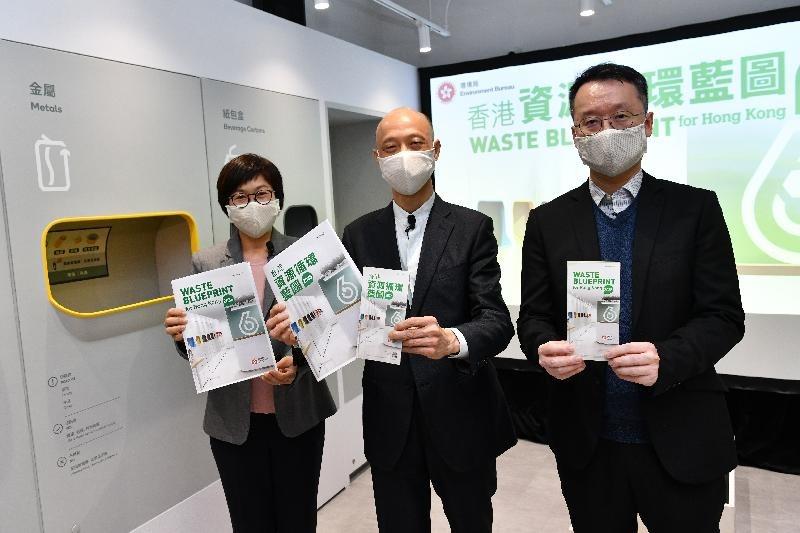 Secretary for the Environment Wong Kam-sing (center), together with the Deputy Directors of Environmental Protection Millie Ng (left) an Bruno Luk (right), present the Waste Blueprint for Hong Kong 2035 document and leaflet to the media on Feb 8, 2021. (PHOTO / HKSAR GOVERNMENT)
Secretary for the Environment Wong Kam-sing (center), together with the Deputy Directors of Environmental Protection Millie Ng (left) an Bruno Luk (right), present the Waste Blueprint for Hong Kong 2035 document and leaflet to the media on Feb 8, 2021. (PHOTO / HKSAR GOVERNMENT)
HONG KONG - The Hong Kong government on Monday announced the Waste Blueprint for Hong Kong 2035 which outlines the strategies, goals and measures to tackle the challenge of waste management up to 2035.
The government said in a statement that the new blueprint advocates "Waste Reduction. Resources Circulation. Zero Landfill" and that it will work with the industry and the community to move towards two main goals.
The government said in a statement that the new blueprint advocates "Waste Reduction. Resources Circulation. Zero Landfill" and that it will work with the industry and the community to move towards two main goals
ALSO READ: Waste clamp spurs effort on recycling
The medium-term goal is to gradually reduce the per capita municipal solid waste (MSW) disposal rate by 40 percent to 45 percent and raise the recovery rate to about 55 percent by implementing MSW charging, while the long-term goal is to move away from the reliance on landfills for direct waste disposal by developing adequate waste-to-energy facilities.
“The Chief Executive announced in her 2020 Policy Address that a long-term strategy blueprint on waste management would be launched. Building on the blueprint released in 2013 and the momentum of previous efforts in waste reduction and recycling, we have formulated a long-term waste management strategy that can keep abreast of the latest situation,” Secretary for the Environment Wong Kam-sing was quoted in the statement as saying.
“Facing the challenges of a downturn in the external recycling market, the current high level of waste disposal, and the scarcity of our land resources, we have to make greater efforts in mobilizing the entire community to practise waste reduction and implement measures for achieving waste reduction and recycling on a considerably larger scale, thereby promoting transformation of waste into resources,” he added.
ALSO READ: In green milestone, China to end solid waste imports
To achieve the goals, the government will promote six major areas of action, namely waste reduction, waste separation, resources circulation, industry support, innovation and co-operation, and education and publicity, leading the advancement of various policies and measures as well as building a circular economy and a sustainable green living environment.
Wong thanked various stakeholders for providing their valuable opinions to the Environment Bureau on the development of the blueprint.
He said the government will assume a more proactive role, such as promoting further various policies and legislation, in particular the MSW charging initiative that would serve at the forefront of effectively promoting waste reduction and recycling.
READ MORE: Progress made on ban of solid waste imports
The Environmental Protection Department has been extending the community recycling network in 18 districts to strengthen the central collection services of recyclables, further encouraging waste reduction and recycling by the general public, and nurturing green living habits in the community.


